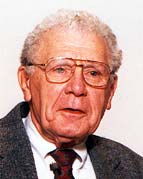Gerry Thompson, a colleague of mine at the Tepper School, has passed away. Gerry was one of the founders of operations research, having done significant work dating back to the 1950s. Much of Gerry’s early work was in game theory (particularly work with Kemeny). Over time, Gerry moved into pure operations research and did a lot of the early work in scheduling and project planning. I just reread his 1960 paper on production-scheduling problems, and it is full of fascinating results that I would have just put down as folklore. I particularly liked the computational results section of this paper, where computers were used long before they could do very much. So Gerry and his coauthor simply generated 200 random schedules for a problem, used their results to convert the schedules into “active” schedules (no left-shifting of jobs) and proposed using the best of those 200. This is a very good idea that presages many current algorithms based on multiple restarts of metaheuristic approaches.
Gerry was a wonderful colleague to have. He was quiet and thoughtful but he brought a host of experience to the issues we faced here. For many years, our MSIA (Masters of Science in Industrial Administration, now called MBA) students learned linear programming on their own with a computer-aided system that Gerry developed. Gerry received an award for this in 1976: I think some readers might be surprised that computers were widespread enough at the time to allow for such innovation!
A few years ago, Gerry’s former doctoral students put on a conference for him for his 70th birthday. There is a volume that came out of that which includes a tremendous appreciation by Bill Cooper. There are a number of wonderful stories about Gerry. Let me recount one about Fred Glover (now rightfully one of the most distinguished and honored researchers in operations research):
Only one example is the case of Fred Glover, who is now regarded as an outstanding contributor to areas such as integer programming and combinatorial optimization. Less well known is that Fred was assigned to me [Cooper] as a research assistant, partly because it was hoped that I could do something for this somewhat lackluster student when he was a Ph.D. candidate at the Graduate School of Industrial Administration (GSIA). I could therefore witness “up close” the transformation that occurred as Fred “came alive” not because of me but because of the course he took from Gerry in the then new area of integer programming. It was almost as though a different person emerged under the same name, as Fred excitedly began to work in integer programming and went o to make numerous contributions in his own right, and then continued to affect otheers as both a teacher and a researcher. Among those who were thus affected by this transformation I can include myself, as I began to realize how much a teacher could (and should) accomplish with the right “alchemy on any student”.
Gerry had a tremendous career with 13 books and well over 160 articles, along with an extremely impressive set of graduate students he affected. Without Gerry, it is likely that operations research would not have been embedded in GSIA (now the Tepper School of Business), so my own path would have been quite different.
Gerry kinda-retired a few years ago, but I would still see him in the building once in a while. While age had slowed him, he still had the grace and kindness that I saw twenty years ago when I was an over-active interviewee for a faculty position here.
I will miss Gerry, and my heart goes out to his wife Dorothea and the rest of his family.
Added November 21
A memorial service for Gerald L. Thompson will be held at 1:30 p.m. on Saturday, December 5, 2009, at the First Unitarian Church, corner of Morewood and Ellsworth Avenues in Shadyside, Pittsburgh.
Gerry is survived by his wife Dorothea M. Thompson; his sisters Margery Nagorny and Janet Lundmark; his daughters, Allison, Emily, and Abigail, and seven grandchildren.
 The mathematician Benoit Mandelbrot has passed away at the age of 85. Mandelbrot made a career in defining and studying fractals, geometric shapes that do not lose complexity as you zoom in on them. Things like coastlines are fractals: as you zoom in on a coastline, smaller and smaller inlets and other curves appear.
The mathematician Benoit Mandelbrot has passed away at the age of 85. Mandelbrot made a career in defining and studying fractals, geometric shapes that do not lose complexity as you zoom in on them. Things like coastlines are fractals: as you zoom in on a coastline, smaller and smaller inlets and other curves appear. Martin Gardner has
Martin Gardner has  Russell Lincoln Ackoff
Russell Lincoln Ackoff  Randy Pausch, the Carnegie Mellon professor whose “Last Lecture” led to a book and world-wide attention, passed away today from pancreatic cancer. From a message from Jared Cohon, President of CMU:
Randy Pausch, the Carnegie Mellon professor whose “Last Lecture” led to a book and world-wide attention, passed away today from pancreatic cancer. From a message from Jared Cohon, President of CMU: